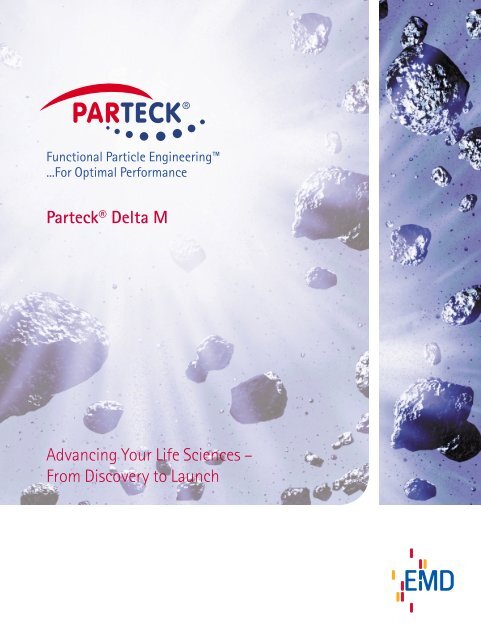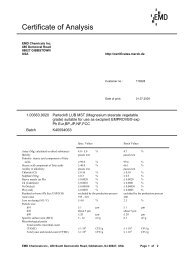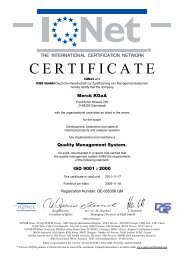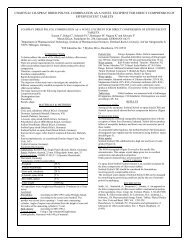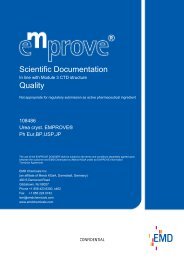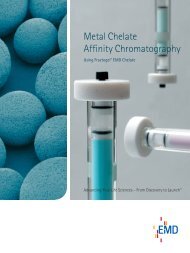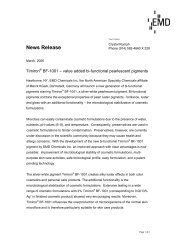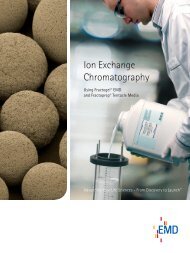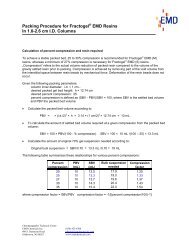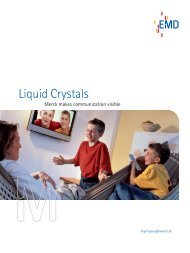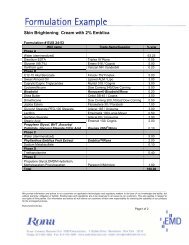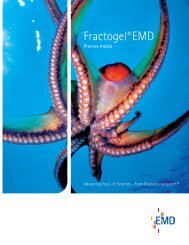Parteck® Delta M
Parteck® Delta M
Parteck® Delta M
Create successful ePaper yourself
Turn your PDF publications into a flip-book with our unique Google optimized e-Paper software.
PARTECK ®<br />
Functional Particle Engineering<br />
...For Optimal Performance<br />
<strong>Parteck®</strong> <strong>Delta</strong> M<br />
Advancing Your Life Sciences –<br />
From Discovery to Launch
Mannitol<br />
· Non hygroscopic<br />
· Non reactive<br />
· Compatible with amines<br />
· Taste masking properties<br />
· Insensitive to stearates<br />
· Vegetable derived<br />
· No BSE/TSE risk<br />
· From fast renewable resources<br />
<strong>Parteck®</strong> <strong>Delta</strong> M<br />
· Unique Mannitol crystals<br />
· 90 % delta-polymorphic<br />
· Large surface area after granulation<br />
· Excellent binding properties<br />
· Accelerated disintegration<br />
· DMF available<br />
· Merck KGaA quality<br />
<strong>Parteck®</strong> is the trade name for a range of products under our<br />
Functional Particle Engineering® concept, which allows us to<br />
design and control particle size distribution, modify the physical<br />
properties of particles and process excipients together.<br />
<strong>Parteck®</strong> <strong>Delta</strong> M, a unique Mannitol in delta-polymorphic<br />
crystals, enables the user to develop challenging formulations by<br />
wet granulation.
Surface in m 2 /g<br />
<strong>Parteck®</strong> <strong>Delta</strong> M<br />
Unique delta-polymorphic crystals<br />
<strong>Parteck®</strong> <strong>Delta</strong> M is the only commercially available Mannitol in a delta-polymorph. Mannitol<br />
occurs predominantly in three polymorphic forms: alpha-, beta- and delta-Mannitol.<br />
Mannitol is known to be the excipient of choice for advanced, highly active APIs due to its nonhygroscopicity<br />
and unreactivity. However, standard Mannitol in beta-form quality often lacks<br />
sufficient binding and compaction properties. <strong>Parteck®</strong> <strong>Delta</strong> M combines both, the unreactivity of<br />
Mannitol and excellent binding properties.<br />
before wet granulation after wet granulation<br />
Large surface area after granulation<br />
<strong>Parteck®</strong> <strong>Delta</strong> M undergoes during contact to water in wet granulation a conversion from the delta to<br />
the beta polymorph. This conversion is accompanied by a 10 fold increase of the surface area of the<br />
Mannitol. The resulting granulate in beta-polymoph is highly porous and has excellent binding and<br />
tabletting properties. The maximal increase of the surface area could be achieved by granulation of<br />
<strong>Parteck®</strong> <strong>Delta</strong> M with about 10-20% water, whereas during the granulation of beta-Mannitol no<br />
increase of the surface area of beta-mannitol was observed.<br />
BET Surface – granules of delta vs. beta-Mannitol produced by wet granulation<br />
2,5<br />
2<br />
1,5<br />
1<br />
0,5<br />
0<br />
<strong>Parteck®</strong> <strong>Delta</strong> M<br />
beta-Mannitol<br />
raw materials 5 % water 10 % water 15 % water 20 % water 25 % water 30 % water<br />
Mannitol was granulated<br />
with water and dried in<br />
a fluidized bed.<br />
Granules larger than<br />
1000 µm were removed<br />
by sieving and BET<br />
surface measured.
160<br />
140<br />
120<br />
100<br />
80<br />
60<br />
40<br />
20<br />
0<br />
<strong>Parteck®</strong> <strong>Delta</strong> M<br />
beta-Mannitol<br />
0<br />
5 10 15 20 25 30 35<br />
Compression Force [kN]<br />
Tablet Hardness [N] Compression Profiles <strong>Parteck®</strong> <strong>Delta</strong> M and beta-Mannitol<br />
Disintegration<br />
Excellent binding properties<br />
The enormous increase in surface area of <strong>Parteck®</strong> <strong>Delta</strong> M after granulation leads to significant<br />
higher tablet hardness compared to standard beta-Mannitol.<br />
A comparison of the two Mannitol polymorphs demonstrates that at a compression force of 10 kN<br />
the hardness of tablets made from water-granulated <strong>Parteck®</strong> <strong>Delta</strong> M (83 N) is around 100% higher<br />
than the hardness of tablets made from granulated beta-Mannitol (40 N).<br />
This enables the formulator to compress at lower forces and thus the wear of the tabletting equipment<br />
can be reduced. Furthermore, challenging formulations with poorly compressible actives can be<br />
compressed successfully.<br />
Accelerated Disintegration<br />
<strong>Parteck®</strong> <strong>Delta</strong> M<br />
4 min 17.5 min<br />
beta-Mannitol<br />
Material (granulated with 15 %<br />
water) was mixed for 5 minutes<br />
with 1.5 % Magnesium stearate<br />
and compressed on a single punch<br />
press at different compression<br />
forces (Korsch EK0 DMS); punch:<br />
11 mm, flat, facetted;<br />
tablet weight: 400 mg<br />
The highly porous structure of granulated <strong>Parteck®</strong> <strong>Delta</strong> M also results in rapidly disintegrating tablets:<br />
Mannitol placebo tablets compressed to a same hardnesses exhibit strikingly different disintegration<br />
times. Tablets made of granulated <strong>Parteck®</strong> <strong>Delta</strong> M with 40 N hardness disintegrate within 4<br />
minutes, whereas tablets made from granulated beta-Mannitol need 17.5 min to disintegrate.<br />
This property of <strong>Parteck®</strong> <strong>Delta</strong> M makes it an ideal choice for any challenging solid formulation,<br />
where unreactivity, non-hygroscopicity, excellent binding properties and, simultaneously, a fast<br />
disintegration is required.<br />
Placebo tablets with hardnesses of<br />
around 40 N were compressed from<br />
a 15 % water granulation and mixed<br />
with 1.5 % Magnesium stearate.<br />
Disintegration test was performed<br />
according to Ph Eur Method.
Merck KGaA quality<br />
The basis for this is the long tradition of “Merck Quality”; this is in turn based<br />
on comprehensive and stringent product analysis that certifies “Merck Quality”<br />
and hence the quality of the customers product.<br />
The production process of <strong>Parteck®</strong> <strong>Delta</strong> M has been filed in form of a DMF,<br />
stability studies, special packaging, regulatory assistance and technical support<br />
are available for the users of <strong>Parteck®</strong> <strong>Delta</strong> M.<br />
<strong>Parteck®</strong> <strong>Delta</strong> M corresponds to USP, Ph Eur and JP<br />
“Merck Quality” has been known for more than a century. We strive daily to<br />
further advance your life sciences – from discovery to launch.<br />
Ordering information<br />
1.12635 <strong>Parteck®</strong> <strong>Delta</strong> M<br />
1.05980 beta-Mannitol<br />
1.05988 beta-Mannitol fine powder<br />
We provide information and advice to our customers on application technologies and regulatory<br />
matters to the best of our knowledge and ability, but without obligation or liability. Existing laws<br />
and regulations are to be observed in all cases by our customers. This also applies in respect to<br />
any rights of third parties. Our information and advice do not relieve our customers of their own<br />
responsibility for checking the suitability of our products for the envisaged purpose.
w303160


